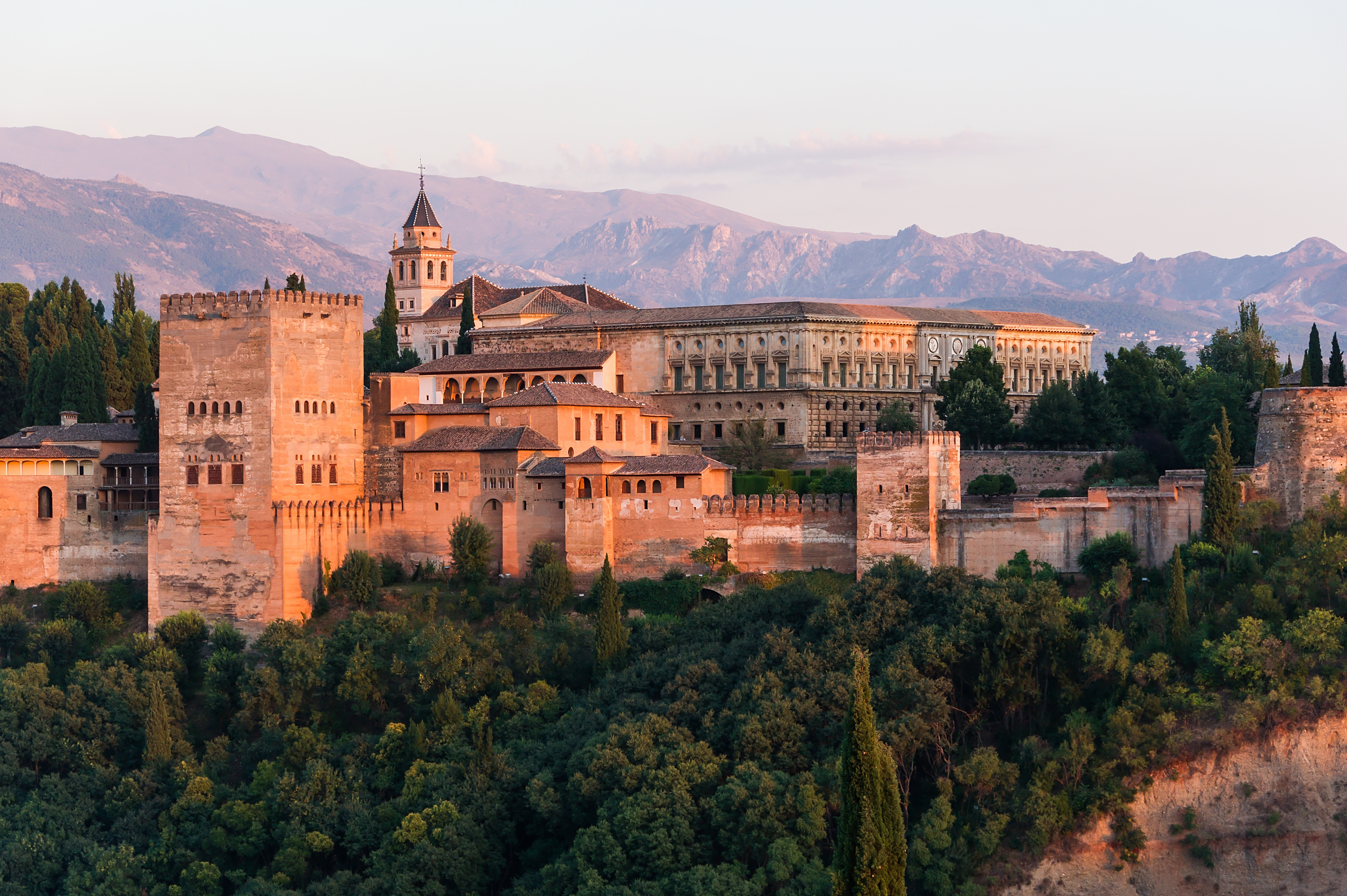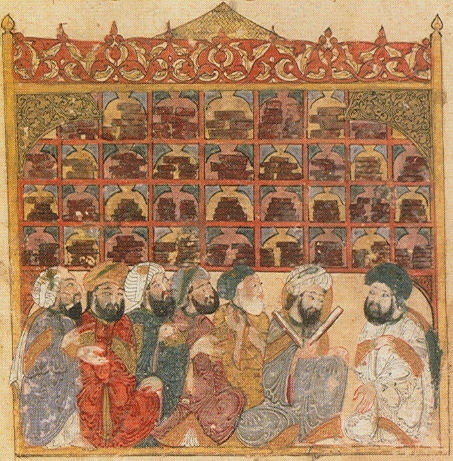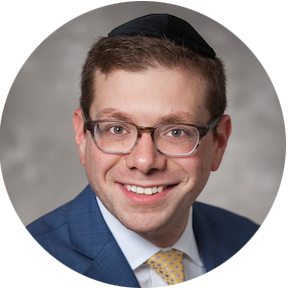
What can Islam Teach Us About the Separation of Church and State?
Shlomo C. Pill
Alhambra/ Jebulon on Wikimedia/ CCO
The First Amendment is designed, in part to prevent – or at least severely limit the degree to which religion can be directly expressed through law and policy and the extent to which law can be used to define and control religious belief and practice. Nevertheless, some religious groups often seek to push against the Establishment Clause’s “wall of separation” in order to secure legal endorsements for religious references and facilitate religious influence over law and policy. For many, this is viewed as a way to strengthen both religion and society. Early colonial settlers in America viewed the material well-being of political society as directly related to its embrace of religious norms and values. From a religious perspective, this makes good sense; God is unlikely to shower grace upon a sinful community. The legal adoption of ecumenical norms and values is also seen as a means of strengthening and improving religion, since rather than leaving faith up to the fickle volunteerism of weak human beings, it facilitates the broad coercive implementation of religious principles.
This approach to strengthening both law and religion is mistaken. Even if we accept that the norms and values of any particular faith tradition represent ultimate goods, it is best for both secular law and for religion to maintain a strong separation of church and state, of religious and political authority. The state ought not determine or enforce religious doctrine, nor should religion have the power to directly determine the course of policy. Somewhat counterintuitively, by keeping religion and state law separated, both can be done better. Each can serve as a more meaningful check on excesses by the other, and each can help insure that the other remains self-critical, relevant, principled yet pragmatic, and authentically legitimate.1See Martin Luther King, Jr., Strength to Love (1967) (“The church must be reminded that it is not the master or the servant of the state, but rather the conscience of the state . . . It must be the guide and the critic of the state, and never its tool.”)
Strangely, perhaps, to the uninitiated, the history of relations between religious and political authority in Islam offers a very strong endorsement of this idea. While many often mistakenly associate Islam with the close marriage of religion and politics, and with the coercive implementation of religious teachings as state law, this is not actually the case. Very early on in Islamic history, political and religious authority were widely regarded as distinct.2See generally Ovamir Anjum, Politics, Law, and Community in Islamic Thought: The Taymiyyan Moment (2012). The determination of religious norms and values was generally understood to be the province of the religious scholars and jurists, or ‘ulema, who generally operated independently of the state. This scholarly independence was supported in part by the Islamic doctrine of the waqf, or charitable trust. Wealthy Muslims regularly established trusts backed by real estate assets, which were managed for the benefit of religious institutions.3See Muhammad Zubair Abbasi , The Classical Islamic Law of Waqf: A Concise Introduction, 26 Arab Law Quarterly 121 (2012). These trusts provided an independent source of funding for mosques, schools, professorships, and private religious scholars and jurists who were able to use this financial independence to avoid working for and being subject to political rulers.
It is best for both secular law and for religion to maintain a strong separation of church and state, of religious and political authority.
From their position of relative scholarly independence, the ‘ulema studied, taught, and wrote works on Islamic law and doctrine. Importantly, while political authorities maintained courts in which Islamic religious law was applied to litigants, the religious norms applied by these state-run courts was determined not by the judges (who were employees of the state), but by the independent scholars and jurists.4See Knut S. Vikor, Between God and the Sultan: A History of Islamic Law 143-147 (2005). Applied religious law thus did not necessarily reflect state policies. On the contrary, the ‘ulema often used their positions as determiners of religious doctrine to criticize and undermine what they viewed as unjust laws. Islamic legal literature is replete with examples of members of the ‘ulema issuing fataawa (legal opinions) that carried persuasive authority in the courts, invalidating measures enacted by political rulers. Shahab al-Din al-Qarafi, a 13th-century Egyptian jurist ruled that attempts by the Sultan to determine the times and places of Friday congregational prayers were invalid, since political authorities could not determine religious questions.5See Sherman A. Jackson, Islamic Law and the State: The Constitutional Jurisprudence of Shihab al-Din al-Qarafi 203 (1996). In a different case, Khayr al-Din al-Ramli, a 17th-century Syrian jurist, held that an Ottoman law permitting landlords to forcibly return peasants that had previously emigrated from their land to another town could not be implemented because it violated the basic religious premise that “the believer is the lord of his own soul.”6Khayr al-Din al-Ramli, al-Fatwa al-Khayriyah, vol. II, pp. 184-185.
In both cases, these scholars could effectively critique and check political power and law precisely because they were working largely independent of state control. If the state could determine religious norms, and even if religious scholars could directly determine state policy as political officials, this independence and the ability to counter rulers’ authoritarian excesses would be compromised. Acting independently, the jurists wielded soft power through their ability to galvanize popular support of Muslim citizens for rulers or policies that the ‘ulema approved, and through their ability to muster serious opposition by the faithful to policies and rulers the scholars condemned on religious grounds.

13th century illustration depicting a public library in Baghdad, from the Maqamat Hariri. Bibliotheque Nationale de France. Source: Wikimedia Commons.
In fact, Muslim scholars carefully policed their own independence by avoiding appointment as state judges or royal patronages – positions that usually came with strings attached. While in one sense being a judge with enforcement powers backed by the state would have given the ‘ulema the ability to directly enforce their religious views in the short term, they recognized that in the long term such a relationship with the state would only compromise their religious authority and persuasiveness, and undermine the integrity of religion as a necessary check on political power.
The relationship between the independent ‘ulema and Muslim political authorities was not one sided. While the jurists were nominally independent, and while their religious erudition and piety typically enjoyed the support of the religiously faithful citizens of Muslim societies, their ability to determine and articulate religious norms and values in opposition to government policy was subject to significant – if informal – checks. Muslims rulers could and sometimes did imprison, torture, or kill troublesome jurists and scholars who went too far in their opposition to state laws and policies. Sometimes, these measures failed, as in the case of Abbassid Caliph al-Mutassim’s imprisonment and torture of Ahmad ibn Hanbal during the mid-9th century Mihnah, or “inquisition.” Other times, however, they succeeded in bringing the jurists to heel. In either case, the fact that the state and not the scholars held a monopoly on coercive force meant that the scholars often prudentially limited their willingness to develop religious doctrine completely independent of political concerns. Indeed, there were numerous times throughout Islamic history, especially during the Ottoman period, when the scholars accepted – and sometimes even proposed – limits on their own independent religious authority so as to preserve some measure of checks on political power in the face of an overbearing state.
The power dynamics between religious and political authority – between faith-based norms and values determined by the scholars, and the regulations and policies enacted by rulers – tended to moderate both religious and state law. Authoritarian leanings of political rulers were moderated by potential or actual criticism by independent religious scholars, whose articulations of religious norms and values emphasized the rule of law, limits on executive power, and the protection of the rights of life, property, family life, education, religious non-establishment. At the same time, puritanistic and authoritarian interpretations of Islamic religious doctrine, which could undermine pragmatic policy making and threaten societal order, were moderated by the threat of state crackdowns on offending ‘ulema.
What Happened? Islamic Separation after the 17th Century
This rosy picture of the mutual checks and balances of religion and state law in traditional Islamic societies is only half the story, however. The traditional Islamic separation of religious and political authority waned under Ottoman rule during the 17th-20th centuries7See Knut S. Vikor, Between God and the Sultan: A History of Islamic Law 206-216 (2005).; under European colonial control8See Wael B. Hallaq, Sharī’a: Theory, Practice, Transformations 396-441 (2009).; and in the Arabian Peninsula and elsewhere under the influence and of the mid-18th century marriage between the religious ideology of ‘abd al-Wahhab and the political power of the al-Sa’ud family. Today, in virtually all Muslim societies, the traditional model of religion-state relations is quite dead, at least in practice. Following the Ottoman and colonial model, Muslim-majority states typically enforce completely secular laws in most areas of life. Where religious law is recognized to a greater or lesser extent – in areas like marriage, divorce, inheritance, and in some places hudood offenses – the norms and standards of Islamic religious law are determined not by independent scholars, but by state officials, often in order to achieve state ends. In some Muslim-majority countries, most notably in Saudi Arabia and Iran, religious law is the law of the state and is determined and applied by scholars and judges working within the official government structure.
The shift from traditional checks and balances of religion and state in Islam to the more recent phenomenon of state-controlled and state-determined religion and law has not exactly produced moderation in either law or religion. This is unsurprising. The juristic tradition of Islamic law developed by the ‘ulema was moderate precisely because it operated in a pluralistic free market of ideas independent of state enforcement. The Islamic legal doctrines that came to define Sunni orthodoxy gained ascendency because they worked; a formula that typically entails substantial moderation, flexibility, and an accounting for real world political, economic, and societal realities in the development of legal standards. Moreover, Islamic religious law was often moderate because it had to be; as an independent source of normative authority, the law developed by the ‘ulema had to avoid direct conflict with the state, and had to moderate its positions to accommodate political realities and concerns. At the same time, the actions and policies of state officials tended towards moderation because rulers relied on the approval of the ‘ulema for their legitimacy, and this approval was contingent on their not straying to far from the religious norms and values articulated by the scholars.
This changed when the state nationalized waqf endowments and began assimilating the ‘ulema into the government bureaucracy, and began asserting its political power to determine when religious law would apply, which interpretations of religious law would be enforced. Incentives for religious moderation by independent scholars were removed, and the now-wedded institutions of religious and political authority could not provide meaningful checks on each other’s authoritarian excesses.
The Islamic experience with the separation of religious and political authority and the institutionalization of effective checks and balances on religious and political extremism is not unique. Similar observations can be made about other law-based religions like Judaism. The lesson, from whatever tradition, is important to appreciate. There is great value to both religion and state law in maintaining the independence of religious and political authority. Contrary to some popular views, religion is actually made more robust, and can be a more influential player in shaping policy when it is kept away from political power. Religious establishments compromise the authority of religion while at the same time giving the state a dangerously powerful tool for justifying oppressive, arbitrary, and authoritarian policies.

Dr. Shlomo C. Pill is a Senior Lecturer at Emory Law School and a Senior Fellow at the Center for the Study of Law and Religion. His teaching, research, lecturing and consulting work focuses on church-state issues, as well as religious law in both Judaism and Islam.
Recommended Citation
Pill, Shlomo C. “What can Islam Teach Us About the Separation of Church and State?” Canopy Forum, October 30, 2019. https://canopyforum.org/2019/10/30/what-can-islam-teach-us-about-the-separation-of-church-and-state-by-shlomo-c-pill/

